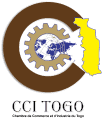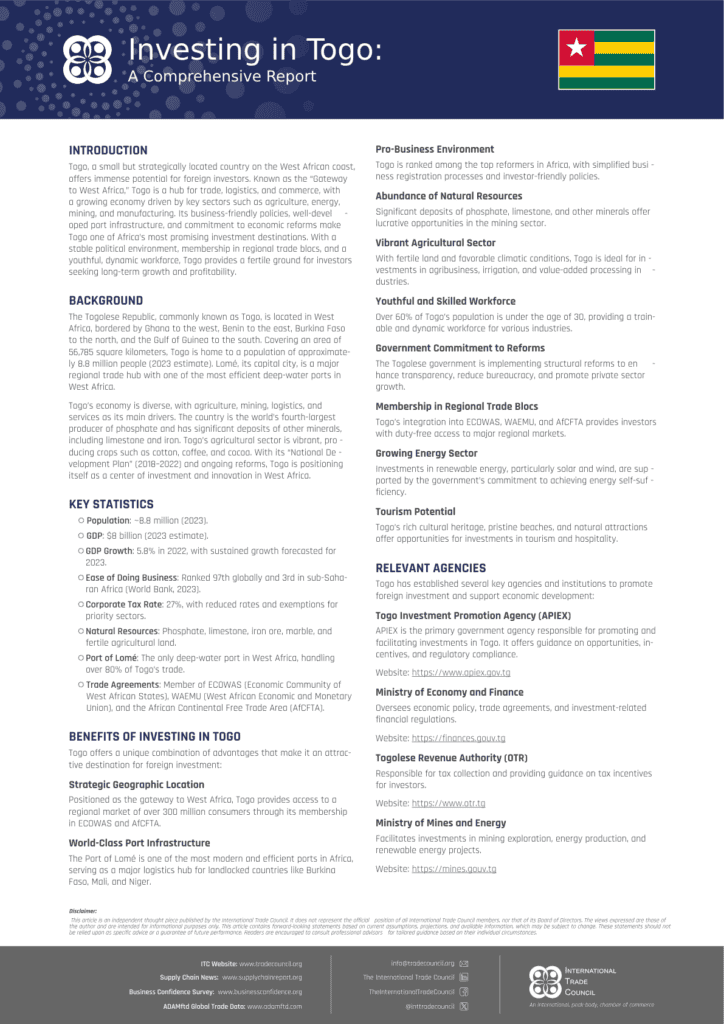When considering doing business in Togo, it is important to understand not just the legal and regulatory frameworks, but also the social, cultural, political, and economic environment. These factors can significantly impact how businesses operate and thrive in the country. Below is an overview of key factors that affect doing business in Togo, including social, cultural, political aspects, foreign exchange policies, the rule of law, and other relevant issues.
1. Social and Cultural Factors
1.1 Cultural Diversity and Languages
Togo is a culturally diverse country, with over 40 different ethnic groups. The two largest groups are the Ewe and the Kabye, but other ethnic groups, such as the Mina, Tchamba, and Tem, also play important roles in the social fabric of the country. This diversity is reflected in business practices, and it is crucial to be sensitive to local customs and traditions.
- Languages:
The official language of Togo is French, and it is widely used in business, government, and education. However, many Togolese also speak local languages such as Ewe, Mina, and Kabye. Understanding or using local languages can help build trust and rapport with local partners.
1.2 Business Etiquette and Practices
- Greetings:
Greetings are important in Togolese culture, and it is customary to shake hands when meeting someone for business. It is polite to inquire about the well-being of the person and their family before getting into business discussions.
- Hierarchy and Respect:
Togo has a hierarchical society, and it is important to show respect to senior individuals in business settings. Decisions may take time, as deference is often given to senior executives or elders.
1.3 Social Norms
- Community Engagement:
Businesses that engage with the local community and contribute to social causes are often viewed more favorably. Corporate Social Responsibility (CSR) initiatives, such as supporting local schools or health programs, can improve a company’s social standing.
- Religion:
Christianity is the dominant religion in Togo, followed by Islam and indigenous beliefs. Religion plays an important role in the daily lives of many Togolese, and businesses should be aware of religious holidays and customs.
2. Political Stability
Togo has experienced periods of political unrest in the past, but recent years have seen relative stability under the leadership of President Faure Gnassingbé. The government has focused on economic reforms and improving the investment climate, though political tensions still exist, particularly during election periods.
2.1 Government Reforms
The government of Togo has implemented several reforms aimed at improving the business environment, including:
- Simplifying business registration through the Centre de Formalités des Entreprises (CFE).
- Improving infrastructure, particularly in transportation, telecommunications, and energy.
- Streamlining tax policies to attract foreign investment.
Despite these efforts, businesses should stay informed about the political climate, especially during election cycles, as political protests or strikes can disrupt operations.
2.2 Corruption and Bureaucracy
Togo has made progress in reducing corruption, but it remains an issue in certain sectors. Transparency International’s Corruption Perceptions Index ranks Togo in the lower half of global rankings, and businesses may encounter bureaucratic delays or requests for unofficial payments. To mitigate this, it is advisable to work closely with legal advisors and local partners who understand the regulatory landscape.
3. Rule of Law and Legal Environment
3.1 Legal System
Togo’s legal system is based on French civil law, and the country is a member of the Organisation pour l’Harmonisation en Afrique du Droit des Affaires (OHADA), which provides a uniform legal framework for business law across 17 African countries. This harmonized legal system ensures consistency in commercial law, which is beneficial for foreign investors.
3.2 Contract Enforcement
Enforcing contracts in Togo can be time-consuming due to the backlog in the judicial system. On average, it takes about 700 days to enforce a contract through the courts, and the process can be costly. Businesses are encouraged to use alternative dispute resolution mechanisms, such as arbitration or mediation, to avoid lengthy court battles.
3.3 Property Rights
Property rights are generally respected in Togo, but land ownership can be a complex issue due to unclear property titles and customary land tenure systems. It’s important for businesses to conduct thorough due diligence when acquiring land or property, and to work with local legal experts to ensure clear title and avoid disputes.
4. Foreign Exchange and Currency Regulations
The official currency of Togo is the West African CFA franc (XOF), which is pegged to the euro at a fixed exchange rate (1 EUR = 655.957 XOF). This stable currency arrangement provides a relatively low risk of exchange rate fluctuations for businesses operating in the eurozone or dealing with euro-based transactions.
4.1 Currency Controls
Togo, as a member of the West African Economic and Monetary Union (WAEMU), follows the monetary policies of the Central Bank of West African States (BCEAO). While the CFA franc is fully convertible within the WAEMU region, there are certain restrictions on the movement of large sums of money out of the country.
- Foreign Exchange Regulations:
Foreign investors can freely repatriate profits, dividends, and capital, but large transfers must be approved by the BCEAO. It is advisable to work with local banks that have experience in handling international transactions.
4.2 Banking System
Togo has a well-developed banking system, with both local and international banks operating in the country. The BCEAO regulates the banking sector, and the country is home to several major banks, including Ecobank and Banque Atlantique.
5. Infrastructure and Logistics
Togo has made significant strides in improving its infrastructure, particularly in the capital, Lomé. The country’s strategic location as a port hub for West Africa makes it an attractive destination for logistics and trade.
5.1 Port of Lomé
The Port of Lomé is one of the deepest ports in West Africa and plays a crucial role in regional trade. It serves as a transshipment hub for the landlocked countries of Burkina Faso, Mali, and Niger. The port is operated by Togo Terminal, a subsidiary of Bolloré Africa Logistics, and is equipped to handle large volumes of cargo.
5.2 Road and Rail Networks
Togo’s road network is improving, but there are still challenges in rural areas where roads may be poorly maintained. The government has plans to expand the country’s rail network, which could further improve logistics capabilities, but the rail system is currently underdeveloped.
5.3 Telecommunications
Togo has made advances in telecommunications, with 3G and 4G networks available in most urban areas. The government is working on expanding fiber-optic networks to improve internet connectivity, which is crucial for businesses that rely on digital communication.
6. Labor Market
6.1 Workforce Availability
Togo has a young and relatively inexpensive labor force, making it attractive for businesses looking to reduce operational costs. However, the workforce is largely unskilled, and there may be a shortage of skilled labor in certain industries, such as manufacturing and IT.
- Key Sectors:
Agriculture is the largest employer in Togo, but there is growing interest in sectors such as manufacturing, services, and telecommunications.
6.2 Labor Laws
Togo’s labor laws are governed by the Labor Code, which sets out regulations on working hours, wages, and conditions of employment. The government has been working to improve labor relations, but businesses may still encounter challenges related to labor strikes or union negotiations.
6.3 Minimum Wage and Employment Conditions
The minimum wage in Togo is XOF 35,000/month (approximately USD 60), but wages may vary depending on the industry. Employers are required to provide social security benefits and comply with safety regulations.
7. Environmental and Corporate Social Responsibility (CSR)
Environmental regulations in Togo are evolving, with the government increasingly focusing on sustainable development and the reduction of environmental degradation. Businesses operating in sectors such as mining, agriculture, or manufacturing must comply with environmental impact assessments (EIA) and other regulations set by the Ministry of Environment.
- Corporate Social Responsibility (CSR):
Companies that engage in CSR initiatives, such as community development or environmental conservation, are likely to benefit from improved public relations and relationships with local communities.
8. Key Government and Business Resources
- Togo Chamber of Commerce and Industry (CCIT)
Website: https://www.ccit.tg
Phone: +228 22 21 22 21
- Ministry of Trade, Industry, and Local Consumption
Website: https://www.commerce.gouv.tg
Phone: +228 22 21 23 42
- Organisation pour l’Harmonisation en Afrique du Droit des Affaires (OHADA)
Website: https://www.ohada.org
Phone: +225 20 21 29 20
- African Intellectual Property Organization (OAPI)
Website: https://www.oapi.int
Phone: +237 222 20 57 00
- Central Bank of West African States (BCEAO)
Website: https://www.bceao.int
Phone: +221 33 839 05 00
- Port Autonome de Lomé (PAL)
Website: https://www.portdelo.tg
Phone: +228 22 61 52 52




